the project why debs
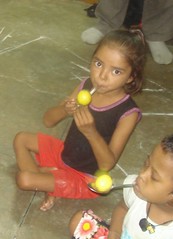 Little Pooja and Radha are not playing a mindless game! No sir. They are proud participants of an international workshop held under the aegis of the Human Development and Capability Association Thematic group on Participatory Methods a group pf the Human Development Capability Association (HDCA) being held in New Delhi this week.
Little Pooja and Radha are not playing a mindless game! No sir. They are proud participants of an international workshop held under the aegis of the Human Development and Capability Association Thematic group on Participatory Methods a group pf the Human Development Capability Association (HDCA) being held in New Delhi this week.
The workshop was held from 5 to 8 September and had two main objectives: 1 – Strengthen the organizational capacity of Project Why 2 – Explore the impacts of Project Why on beneficiaries of their work with children. The results are awaited and we all, and I in particular, wait with bated breath for the outcome.
But this post is not about whether or not we passed the litmus test, or what measures need to be taken to strengthen our capacities, this blog is about the other side of the workshop, the tiny moments that may have escaped many, the backstage angst, the fleeting moments of pride, the surreptitious phone calls to assert that all is going well, the furtive gestures to ensure that nothing is missed and more.
For 4 whole days project why was on its toes though we did try to put up an equable face. A plethora of different activities were scheduled at different times and places. It was impossible to keep an eye on all as we would have liked to as most of us (teachers and the management team) were part of a SWOT exercise that took a large chunk of time. I must confess that when we were told about having to spend nine hours (3×3) in a room the reactions of everyone were to say the least noteworthy: raised eyebrows, perplexed faces, vigorous shakes of the head and total bewilderment. The motley crew that makes up the extraordinary project team was in a quandary. They all knew that we were to play hosts to a dozen eminent academics from the world over and every one felt diffident. Would we come up to the expectations?
Moreover the past few weeks had been marked by furious preparations with the help of Sara who had come a month earlier to help prepare the workshop. The activities had to be meticulously planned: children identified, parents informed, teachers assigned, transport organised. Props needed to be made, translations done keeping in mind the ground and social reality. Then it was time to explain it all to the team and I guess our own nervousness must have added to theirs in quantum leaps.
D Day dawned after a sleepless might. We all felt like debs on the even of their coming out ball. For the first time we were to be showcased to those that mattered and that would in many ways define our future. We were aware of the fact that in spite of all our careful planning there would be many slips and glitches but decided to put our best foot forward.
The workshop began and we were carried in the whirlwind of activities barely having time to think. We simply moved from one activity to the other and one day to the next. In between we fed our curiosity on the bribes of phrases we heard along the way. As the participants visited some part of the project or finished one particular activity we devoured the “the children are great” ; “what nice answers”; “stunning pictures” ; “interesting debate” that we overheard. It seemed we had come out winners or at least been accepted warts and all!
The frightening SWOT went off like a breeze thanks to the wonderful professor who steered it. We sheepishly recalled how scared we had been and how apprehensive we had felt about the whole matter. Renato was extremely warm and managed to make even the quietest teacher not only speak but share his or her inner most feelings. We discovered things about ourselves and others and above all saw how much we shared in common. It was a priceless experience for all.
We now await the official results but I was made privy to some. The subtle and even anodyne games were powerful tools that helped delve into the children’s mind and bring out their aspirations and hope. It also brought out what project why had taught them and that was a matter of great pride: some children selected the library as their most precious option while others took pictures of places of worship other than theirs to show that they had understood the importance of respecting each other. Many children wanted their friends to also join pwhy and that alone made our hearts swell with pride.
I could have waited for the official results before writing about the workshop, but the excitement was too much and somehow I felt this candid account would better showcase what I felt. It is the moment to express my indebtedness: to all those who made this workshop a reality – Mario, Renato, Nicolo, Sara, Alex, Jean Francois, Jim, Francesco, Sara, Ina – by coming and spending their invaluable time with us, to the pwhy team without which none of this could have been possible but above all to the children of project why who are a living proof of the indubitable reality that every child, no matter how deprived, has a right to dream and we are blessed to be those who are entrusted with the challenging task of making these dreams come true.
Head fake….
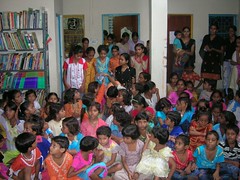 Head fake or indirect learning is a expression I have learnt recently from Randy Pausch’s Last Lecture. In hindsight it is something I have been using, albeit surreptitiously and perhaps sometimes even unconsciously!
Head fake or indirect learning is a expression I have learnt recently from Randy Pausch’s Last Lecture. In hindsight it is something I have been using, albeit surreptitiously and perhaps sometimes even unconsciously!
Yesterday I was quietly handed over a CD with pictures of the women centre. They were snapshots of their everyday activities as well as those of the Independence day celebration they had organised. As I browsed through them I was taken aback by the vibrancy and vitality that permeated each of them. And above all I was taken aback by the number of children that smiled at me. I could not believe that a year back this centre was not even in existence.
It is true that the women centre was initially set up as a refuge for women in distress, an answer to the deafening why posed by the plight of Utpal’s mom. But we could have found a tiny place and given her shelter. But that was not to be. Instead we set up the women centre which is not only a refuge for women in distress but a vibrant children centre and community outreach programme.
Herein lies the head fake.
Planet why was on the anvil as the panacea to all problems of pwhy. It looked good on paper, it looked good in words but there lay a unexpressed and unformulated doubt: would it run and survive in spite of the fact that it was miles away? The women centre is its present avatar was the much needed surreptitious testing. Would it be possible to set up and run a complex centre without constant monitoring and hand holding.
Barely 10 months from the day we found the quaint premises that houses the women centre we have a happy place where over 200 children and 50 women are busy changing their morrows. No mean task!
What is truly remarkable is that this centre grew from a few kids to this staggering number without fuss or drama. All decisions were taken in house: staff was identified and selected, time tables made, course corrections made. All crises, and they were many, solved without fuss. Today the women centre has a creche, primary and secondary support classes, tailoring and beauty courses and a weekly women’s meet where a plethora of diverse issues are debated amidst laughter and cups of tea!
I have my answer and my head fake worked. Planet why will not only run and survive, but thrive. This is undoubtedly a huge moment for me personally. When pwhy began I had many dreams, and one of them was to see the local community take on responsibilities and take charge. My dream was to see my teachers and staff spearhead new activities. It has happened and somehow I know pwhy is safe.
Here are some pictures of the women centre, a centre that was set up and is run by those many of us do not trust or even bother to acknowledge, a bunch of remarkable people I am very proud of.
| www.flickr.com
|
have we given up…
 It was almost 10 days or more ago that Radhey my auto rickshaw driver informed me in a matter fact way that a barrage had breached in Nepal and that floods in his village were imminent. It was just a matter of days. I could not at that time fathom the magnitude of the disaster in waiting. Every morning in a matter of fact way I would enquire about the flood and he would answer that the waters were coming. I must admit I did not see the urgency. How could I. Even the press did not report much. By the time India woke up it was very late: over 3 million people had been rendered homeless, a major river had changes its course, villages had been swept away, lovingly built homes obliterated from the face of the earth.
It was almost 10 days or more ago that Radhey my auto rickshaw driver informed me in a matter fact way that a barrage had breached in Nepal and that floods in his village were imminent. It was just a matter of days. I could not at that time fathom the magnitude of the disaster in waiting. Every morning in a matter of fact way I would enquire about the flood and he would answer that the waters were coming. I must admit I did not see the urgency. How could I. Even the press did not report much. By the time India woke up it was very late: over 3 million people had been rendered homeless, a major river had changes its course, villages had been swept away, lovingly built homes obliterated from the face of the earth.
In a popular TV debate aired a few days back the anchor asked the disturbing and startling question: Does India care about Bihar? And the uncomfortable answer that made us squirm in our chairs was: No! Bihar simply seems to have fallen off the map. We just want to wish it away. The news from the ground gets grimmer by the day and no respite is in the offing. The figures are alarming millions of people have lost their homes and livelihood.
Almost every year Bihar suffers the fury of floods. Some years are worse than the other and lead to large scale migration. It was in 1985 that Radhey fled his village and came to Delhi to build a new life. Like many others he sent money regularly to his village to repair the house, build a new one, buy the much needed farm implement. Today everything is gone. The members of his family have fled the raging waters and taken shelter with relatives. Some have even come all the way to Delhi and will swell the ranks of the staggering migratory population of this choking city. Many pwhy children’s families have similar stories. What is saddening and infuriating is the calm with which they share their plight, as if they too have given up.
It took a long while for India to waken up, or has it really as in spite of the magnitude of the calamity there is no palpable urgency: no dramatic headlines, no continuous coverage… It is as if floods in Bihar are regular occurrences. Bihar once a vibrant state of India, the seat of the Maghadh Empire, of Licchavi the first known republic, of Buddhism the religion of tolerance is today neglected and derided. It is today equated to corruption, hooliganism, gang and caste wars and considered an aberration. Yet it is home to millions of people who bravely fight all odds.
The picture you see dropped in my inbox with an appeal for help.It took me some time to figure out that what looked like a mosaic pattern where actually people left stranded on a washed away road. Imagine the number of children who today instead of setting out for school are living in the open, hungry and wondering where all their dreams have fled. Imagine the number of people deprived of all the facilities we take for granted: water, food. medicine, shelter. Imagine the pain of seeing your life come to naught. Where does one pluck the courage to begin all over again.
Have we given up on Bihar. I do not know. All I know is the contempt with which the word Bihari is used. All I know is the baffled look on people’s faces when I tell them I too am a Bihari. All I know is that today I feel the need to reach out to those in need, casting aside the cliches and commonplace utterances one will be subjected to. Yes we know of the corruption that is rampant during all relief operations but does that absolve us of the duty to do something. Certainly not. As with the tsunami we will wait a little and when the initial wave of help dies down we will try and see how we can help some children reclaim their lost dreams.
loss of innocence
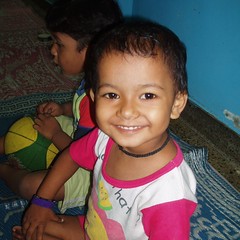 It is fifteen years since the golden summer of 1991 when we lost our innocence wrote Gurcharan Das in a recent article. He was of course referring to our new affair with the the free economy and our expansion as a growing economy. I am no economist and do not understand market forces and the likes of it. I simply see what is around me and draw comparisons with was was an what is.
It is fifteen years since the golden summer of 1991 when we lost our innocence wrote Gurcharan Das in a recent article. He was of course referring to our new affair with the the free economy and our expansion as a growing economy. I am no economist and do not understand market forces and the likes of it. I simply see what is around me and draw comparisons with was was an what is.
Last week we celebrated or let us say commemorated 61 years of Independence. All leading magazines had special issues and one must admit no one had anything glorious to share. Even Vinod Mehta who always proffers some light relief on his last page candidly states: I’m looking to offer you some humour. Alas, there’s none to offer. A quick read of the Independence day issue of this or any other magazine does not make happy reading. A leit motiv seems to appear almost with obsessive regularity is the fact that our brave walk on the free economy path has further alienated the poor of the rich. The rich have their schools, their hospitals, their habitat, their markets, their just about everything whereas the infrastructure of the poor is growing from bad to worse.
One of the articles that caught my attention was the one on gated Communities aptly titled Free from India.
The proliferation of gated communities is undoubtedly a world wide phenomena and its Indian avatar larger than life. An article in the New York Times reflects the sad reality of gated communities in our capital region. If one India lives a life of luxury inside the walls, the other survives at its very gates. The raison d’etre of these communities is best defined by a resident himself who states: Everyone understands that there are things outside that you don’t want to expose your children to. The idea is to have the area sealed and sanitised. The apartment costs are huge, but it’s worth it to protect yourself from the violence and crime outside… When I leave these gates I am bang slap in modern India. I can’t say that I don’t like India; it’s my country. But if I can avoid exposing myself to it, why not?‘
The above statement is to say the least perplexing and saddening. Are we simply giving up on India? is creating comfortable and yet visible cocoons the real way out. Did we really lose our innocence when we decided to walk the free trade path and open India’s doors? I cannot say. But if an Indian says that he or she does not want to expose his or her child to things outside, outside being the real India then something is terribly wrong. As citizens of India are we not responsible for that very outside.
from email to webpage
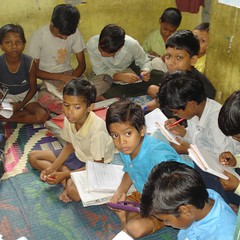 It was exactly one year ago almost to the day that a mail dropped into my inbox. My name is Willy and I am very interested in becoming involved in Project Why. I run a small NGO in America called the Omprakash Foundation. Those words were the beginning of a beautiful journey of mutual discovery, a journey were the key words were love, compassion, respect and trust.
It was exactly one year ago almost to the day that a mail dropped into my inbox. My name is Willy and I am very interested in becoming involved in Project Why. I run a small NGO in America called the Omprakash Foundation. Those words were the beginning of a beautiful journey of mutual discovery, a journey were the key words were love, compassion, respect and trust.
Yesterday another mail dropped in my inbox. It simply said: check out”featured partner” on the omprakash homepage.…. A click on the page and there we were: Project Why as this Season’s featured partner with a special page on us that described our activities and our needs in beautiful and simple words. It was indeed some journey from email to webpage!
Over the past almost ten years I have come across wonderful people who have reached out to help us and each one of them have made pwhy possible. When Willy and his friends landed in Delhi a few months back it was truly a special moment as such kids are one of a kind. They brought with them all that makes today’s world still bearable.
But let us go back a little. Before we met Willy and I use to exchange long emails and I found myself sharing my deepest thoughts with him quite unabashedly. It never came to my mind that more than 4 decades of life on this planet separated on us. He simply became the friend I needed in moments of doubts, pain and joy. He always had the right words and often gave my sagging moral the fillip it needed. Somewhere along the way he shared his dream of bringing books to the lives of children all over India and though it was in no way up our sleeve, there was not an iota in doubt in my mind when I decided to jump on the wagon and make it a success. Today over 200 000 books have found their way into the remotest part of our land and are brightening up the lives of many children. Project Why children too are busy discovering the magic of the written word. And what better proof of success of this venture than the fact that some books did surreptitiously find their way into children’s homes!
As the omprakash story enfolded it was as if a remote dream of mine was coming to life albeit in a land thousands of miles from mine. I have always prayed to see the day when young Indians would be touched by compassion and would reach out to less fortunate people and share some of what they have:time, resources, love… as this is what omprakash is all about. A bunch of kids backpack through India and other lands. On the way they stop by to volunteer in a few organisations and somewhere along the way they decided to do something. And the something is for all to see!
What makes Willy, Gordon, Ashely, Lilly, Steve, Nick, Elliot tick? I do not know. Or to use a Hindi expressions: of what mater are they made. I guess the very same one we are made of. But the difference lies in their ability to see with their heart. And what does it take to make young successful people see with their heart is for me a zillion dollar question? I must confess that when I started project why one of the head fake or indirect learning (to use Randy Pausch’s expression) objective was to try and sensitize young Indians and show them how to see with their hearts. Sadly it was not to be.
The journey from email to webpage has been a exhilarating and rewarding one. To the uninitiated it can be quantified by the generous resources we have received and that we are truly grateful for. But for this old lady it has been much more: a renewal of faith and trust, a validation of ideals that many found preposterous and absurd, a ray of sunshine in a sometimes grey world and much more that remains tacit.
I truly hope and pray that all the omprakash foundation reaches unknown heights and realises all the hopes and aspirations of the wonderful hearts that steer it. And I know that this will happen as more than anyone else a wonderful old man, who touched the lives of these kids many summers ago and whose name is the one they chose for their organisation, blesses them as he simply litstens to his radio in a remore part of India’s capital city.
Huge eyes in a scarred face
 As I was leaving the women centre yesterday I was as usual greeted by loud good morning maam’s (notwithstanding the time of day) from the gang of kids that live in thee vicinity and often play in front of the centre. I stopped as I normally do. Amongst them was a new face. Huge melting eyes in the middle of a tiny badly scalded face. A closer look reveals burn scars on the body, arms and a badly maimed hand. I stop in my tracks, my heart pounding and am suddenly taken back to the fateful day in March 2003 when I first laid eyes on the little scalded Utpal.
As I was leaving the women centre yesterday I was as usual greeted by loud good morning maam’s (notwithstanding the time of day) from the gang of kids that live in thee vicinity and often play in front of the centre. I stopped as I normally do. Amongst them was a new face. Huge melting eyes in the middle of a tiny badly scalded face. A closer look reveals burn scars on the body, arms and a badly maimed hand. I stop in my tracks, my heart pounding and am suddenly taken back to the fateful day in March 2003 when I first laid eyes on the little scalded Utpal.
The little girl standing in front of me is about 2. Her scars look almost as old. I look around for answers to my silent questions. After a few long seconds an older girl offers some insight: the little girl was burnt when she was just a baby. She was sleeping in a mosquito net, the kind you find in all markets and that look like a huge bell. There was an oil lamp burning in the vicinity and the net made of cheap nylon caught fire. The baby too!
She survived. But unlike Utpal whose face had got spared, hers got badly scalded. Two huge almost identical scars mar her little cheeks. But somehow her impish smile and lovely eyes are endearing and make you forget the ugliness of her scars. To me she was just a child, with the same dreams, aspirations and hopes in spite of her scars and maimed hand. My mind is choking with questions and emotions. What will the future hold for her? What can we do? How can we ease her morrows? How do her peers treat her? Why is God sometimes so unkind?
Just like Utpal’s, her family too shifted only recently to a house almost adjacent to our women centre. Is there some hidden Jungian synchronicity? Some hidden message? Is it once again the God of Lesser Beings at his best?
I do not what the future holds. As I write these words I dot even know her name let alone anything about her. All I know is that I cannot and will not be a silent spectator. A maimed girl has no morrow in a land like ours where the future of any girl child lies in her ability to find a good match. Her family is poor and will not be able to make up for the scars and the maimed hand by providing her a handsome dowry. I do not know whether medical wizardry can be of help and even it it is at what cost it will come. I know that a good education and sound income generating skills are the only hope she has.
I will go back to the centre today and set the ball rolling by seeing that she is enrolled in our creche. I will call up all the men in white I know, browse the net and connect with anyone one i think can be of help. I will do everything I can to ensure that the huge eyes in the scarred face remain filled with trust and hope and never have to suffer the indignity and stigma that is often the fate of those like her.
the man, the bear and the old coat
I was invited by a dear friend to write the 1000th post of his blog. It was an honour and it took me a long time to decide what to write. You can read the post entitled childhood dreams here.
a perplexing reality check
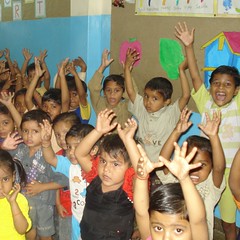 After a long time I decided to check the site traffic on both the website and the blog. To say that I was in for a surprise would be the understatement of the year! I would have liked to believe that something was wrong, that the code was not correct, that the programme was not running properly. But that was not the case. All seemed in order except the flat line that greeted me instead of the pikes and curves. No one had dropped by in a long long time. I was staggered. I had been posting regular entries and nothing seemed to have changed.
After a long time I decided to check the site traffic on both the website and the blog. To say that I was in for a surprise would be the understatement of the year! I would have liked to believe that something was wrong, that the code was not correct, that the programme was not running properly. But that was not the case. All seemed in order except the flat line that greeted me instead of the pikes and curves. No one had dropped by in a long long time. I was staggered. I had been posting regular entries and nothing seemed to have changed.
Many questions crowded my mind: what had happened? what was I doing differently? what needed to be done? was there a hidden message? and each begged for an answer. True there was a time when over and above posting on the blog, one wrote mails to all friends and supporters with regularity, sharing news or begging for help. The last such onslaught had been at the beginning of the year when we were looking for help to buy our land. The land was bought and somehow unknowingly we had entered a new phase of our existence. Gone were the days when we simply needed enough support to survive month after month. We were now in another league. And perhaps this unconscious shift changed things surreptitiously.
The flat line that greeted me this morning was a harsh reality check. Something was wrong. Was it a case of out of sight, out of mind. A simple lack of visibility. I cannot tell. True we have not been in the media for long and true that direct communication has been far and few but things on the ground have not changed. We are very much alive and need all the help we can muster. We are still dependent on individual help and conscious of the fact that till date most of it has come via the net and blogging. So a flat line is akin to a death knell.
Had I sunk into a strange comfort zone where I thought that simply posting blogs would be enough to garner support. I must confess that there was a time when I did network much more actively. Was I content with the occasional comment posted on some bogs and felt secure? Maybe. But the flat line was a rude wake up call and I guess a much needed one.
We are alive and much of what we were earlier. We still reached out of over 600 kids and reach out to anyone in need of help. Our kids still bring us a 100% result and we had some excellent results in the Boards. Our women’s programme has grown remarkably and our new residential inclusive outreach is doing exceptionally well and is a great learning experience and a sound testing ground for planet why. We still need all the help we can get and have in no way grown a big head!
I confess to have been a little slack in my ways and promise to make huge amends as the life hopes and aspirations of many depend on it.
three generations of freedom
 The UNICEF report of the state of Asia Pacific’s children 2008 was published just a few days ago. According to this report 20% children under five who die every year are from India. The figures is staggering: 2 million. the report goes on to state: Unless India achieves major improvements in health, nutrition, water and sanitation, education, gender equality and child protection, global efforts to reach the MDGs will fail…as more services within countries are privatized and the government share of health budgets diminishes, public facilities become more run down and health workers leave for better paid jobs in the private sector or outside the country. The divide between rich and poor is rising at a troubling rate within sub regions of Asia-Pacific, leaving vast numbers of mothers and children at risk of increasing relative poverty and continued exclusion from quality primary health-care services.
The UNICEF report of the state of Asia Pacific’s children 2008 was published just a few days ago. According to this report 20% children under five who die every year are from India. The figures is staggering: 2 million. the report goes on to state: Unless India achieves major improvements in health, nutrition, water and sanitation, education, gender equality and child protection, global efforts to reach the MDGs will fail…as more services within countries are privatized and the government share of health budgets diminishes, public facilities become more run down and health workers leave for better paid jobs in the private sector or outside the country. The divide between rich and poor is rising at a troubling rate within sub regions of Asia-Pacific, leaving vast numbers of mothers and children at risk of increasing relative poverty and continued exclusion from quality primary health-care services.
It is a sad reflection of a country that celebrates three generations of freedom.
Our real achievement seems to have been a staggering increase of the gap between the rich and the poor. India is far from shining. The children of India are still waiting for an elusive Bill that will give them their constitutional right to Education. And while a city is gearing up to meet world standards to host an international sporting event, children are withering away in dark holes in a city that has forsaken its poor.
Can any society worthy of its name claim to be shining if its most vulnerable group remains neglected? I wonder. Children have no voice, and are not vote banks. Yet they need the maximum care and protection. It is not so in India today. Child labour is rampant, child abuse of all shade and hue unbridled and though politically correct statements are made by one and all, they are rarely translated into action.
Two million children below the age of 5 die quietly every year in India. Is anyone hearing.
women power
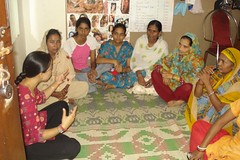 If change is to truly come about, it has to be routed through women. This is something I have firmly believed and yet something that has remained elusive. When project why began almost a decade ago, one of the first things we tried to set up was a self help group for women only. The idea was to get women together around an economic activity and then try and raise awareness about burning social issues in the hope of making the group an agent of change.
If change is to truly come about, it has to be routed through women. This is something I have firmly believed and yet something that has remained elusive. When project why began almost a decade ago, one of the first things we tried to set up was a self help group for women only. The idea was to get women together around an economic activity and then try and raise awareness about burning social issues in the hope of making the group an agent of change.
My mother who was in many ways an avant-garde feminist of sorts had always held women responsible for their own plight. She reveled in pointing out that most of the crime against women was perpetrated by women themselves. The most glaring example being that of the mother-in-law daughter-in-law relationship. And she went to add that it was women alone that could free themselves and bring about change.
A two day old bay girl was found in a plastic bag near a garbage dump in Delhi last week. We seem to be the capital of abandoned baby girls. Needless to say that it is far to often women who commit this abomination: a desperate girl not wanting to hear any more taunting, or one wanting to spare another a life of ignominy or perhaps a kind soul hoping the child would find a better life. What is shocking is that this is happening in India’s capital city! The reality is indubitable: little girls are not welcome. And it is also true that women alone can make them feel wanted.
Our erstwhile women’s group failed to bring about the results we wanted. Our efforts to get women to start a small unit making healthy snacks for school children – in lieu of the few rupees given to children to buy dubious eatables – failed miserably. In hindsight there were many reasons for the failure. Women were not willing to go out and market their ware. They wanted to make the snacks for a salary. This was probably due to the fact that their husbands prompted them to do so as everyone felt that NGOs have loads of money to spare. Or maybe it was because everyone who comes to the city feels he or she has a right to a job. Hard work is a prerogative of the village. Or perhaps it was due to our lack of experience in the field. Whatever the cause the attempt failed miserably and the idea was shelved.
When we seeded our women centre it was primarily to give refuge to women shunned by society and help them rebuild their lives. But right from the very first day we felt the need to reach out to local women in the hope that some day we would be able to revive old dreams and get our women’s group going. The challenge was to be able to have them review their lives and make appropriate changes. The ploy was to first gather home around an innocuous activity like stitching. Then as time went by and bonds were created we moved on to weekly meetings around a variety of subjects and cups of hot tea! Then a series of unforeseen circumstances slowed down the momentum but some time back Rani and Shamika took on the challenge and revived the process.
Now every Thursday over a dozen women come to discuss and debate several issues and share their views and dreams. And perhaps in days to come we will be able to revive our women’s group around a new activity that all would have decided upon. It is a first step in the right direction. I hope it does live up to our expectations: that of helping women set themselves free!
way to go India
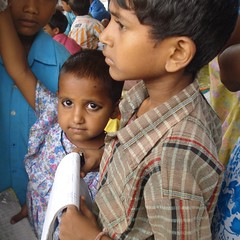 The teach India campaign is in full swing, or so we would all like to believe. Our tryst with them was short lived: we did not fit the model they proposed as we could not take in the minimum of 100 volunteers that they offered – we had asked for six. The organisers could not understand why in spite of our 9 centres we were unable to accept the 100 volunteers offered. To them the maths was simple: 9 centres into 2 shifts into 6 days = 108!
The teach India campaign is in full swing, or so we would all like to believe. Our tryst with them was short lived: we did not fit the model they proposed as we could not take in the minimum of 100 volunteers that they offered – we had asked for six. The organisers could not understand why in spite of our 9 centres we were unable to accept the 100 volunteers offered. To them the maths was simple: 9 centres into 2 shifts into 6 days = 108!
We tried to explain to them that it would be terribly unfair and even disruptive to the children and their teachers to have a new volunteer each day of the week. And though they did try to pressurise us, we stood firm: the children and their well being was far more important to us than being associated with any campaign no mater how glitzy or big.
I decided to spend some time on the website of the teach India campaign and landed on their message board. I was saddened to see that there were many young volunteers waiting for a phone call that would tell them they had been selected and would assign them a teaching opportunity. The message board was replete with words like: not received a call, no reply, no call, I am disappointed, how long?????
My heart went out to these young Indians who had taken a first step towards making a difference and were waiting for the call that would allow them to do so. Some even said they had registered 2 months ago and the campaign being for 3 months I wonder if their phone will ring. There were a few lucky ones and they shared their experiences which were heartwarming. The idea is a winner and it would be a tragedy if it failed.
In the midst of all the message threads was one that brought whoops of joy: tt simply said: Can we Form a Group if teach India doesn’t call us and go ahead. For me those simple words showed that no matter how the blitz ended it had succeeded as it had ignited a sparkle in young India. Here was a group of youngsters who were not waiting for calls but simply going ahead. They had understood the real message, the one that would save and change India. One did not wait for someone else but took on the challenge and make it happen.
I sincerely hope that the thousands of would be volunteers who may not get a call will not give up but will find it in themselves to carry the torch and teach India
the price of urban dreams
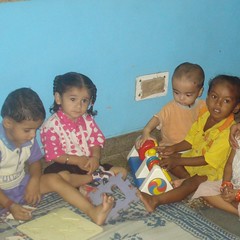 When little Prakash was born we were delighted as he was a bonny baby. His mom was part of our programme for pregnant and lactating women and all seemed to pint to the fact that our three month intervention programme worked. But we were in for a rude shock.
When little Prakash was born we were delighted as he was a bonny baby. His mom was part of our programme for pregnant and lactating women and all seemed to pint to the fact that our three month intervention programme worked. But we were in for a rude shock.
Months went by and instead of thriving, Prakash began to wither. His head was the only part of him that seemed to grow, the rest his body could not keep up. His milestones were delayed and it was as if the child was vanishing. He sat in a corer of the creche, his legs folded not able to stand in spite of being 14 months old. Hi social skills remained poor and all you got from his after a lot of prompting was a toothless smile. Local doctors felt he had hydrocephalus. A series of tests were done but with no clear results. His pitiable state was heart wrenching. Not able to stand helpless we sent him to the paediatric ward of leading hospital and we has diagnosed with rickets! We were aghast as rickets is a form of severe malnutrition.
I began reading about rickets and discovered that one of its main causes is vitamin D deficiency or in other words lack of sunshine. The penny dropped. In a city where housing is a huge problem, greedy landlords have brought down their old structures, one with courtyards and sunshine, and built airless and windowless rooms where night reigns all day. When we were looking for a room for 7 month pregnant Madhu, Prakash’s mom, we found one across the street. It was dark and that is where the mother spent her last months of pregnancy and delivered Prakash. It was also there that he spent the first few months of his young life. NO matter how well we tried to feed the mother and then the child, we were unable to make up for the sun rays.
Many children are born and live in dark holes where the sun never shines. This is the price to pay for urban dreams a far cry from village life where the sun is abundant and where children spend time in the open, even as babies who are oiled and massaged and left out in the courtyard under the watchful eyes of the clan. I remember being shocked when many years back our cook brought his mother to the city for a medical check up. The woman looked very old, as all village women do, and was thin as a reed. But when her blood tests were done her haemoglobin was over 13, something rare in India. I knew the family was poor and wondered how that could be possible. he answer was simple: the family ate black millet instead of wheat flour, as the millet was what they grew in their fields, and black millet is know to be rich in iron. The family also ate lots of seasonal vegetables that grew in their yard something impossible in a city.
We will tend to little Prakash and hope he improves and makes up for lost sun. But I wonder how many little Prakashs live undiagnosed in the city.
typos, laws and the morrows of tiny souls
 To abort or not to abort that is the question? The last week has been replete with debates and discussions on the issue. The fate of a little unborn child lay in the hands of an archaic legal system and complex medical opinions. Two days back the courts decreed that the child was to live. This is not the latest plot of some avant garde movie but a real story.
To abort or not to abort that is the question? The last week has been replete with debates and discussions on the issue. The fate of a little unborn child lay in the hands of an archaic legal system and complex medical opinions. Two days back the courts decreed that the child was to live. This is not the latest plot of some avant garde movie but a real story.
An unborn foetus was diagnosed with a congenital heart problem. The parents sought legal sanction to abort the baby though the foetus was 26 weeks old on the grounds that they would not be able to bring it up. The hospital gave vague and contradictory opinions and to crown it all there was also a typographical error that sealed the fate of this unwanted child. The case has led to an onslaught of divergent opinions and debates- a mother’s right, the right to life, the plight of disabled children in India, the lack of support systems – and the battle is still on. Help has also be forthcoming for this baby: offers of adoption and free medical care. The one question that has not been raised is why this family went public with this issue in a land where clandestine abortions are an easy option? And one also wonders whether the parents now in the media and public glare will come to terms with the situation and give this child all the love and care it needs. Only time will tell.
All the children in the picture above have congenital heart conditions and thank heavens their parents did not think of aborting them. They belong to very poor families who and yet each one of them did everything they could to ensure their kids would live. Was it their prayers or the hidden hand of the God of lesser souls, but they all found their way to our heartfix hotel where broken hearts get repaired. Today they are all living healthy lives like any other kid and though there may be problems in the future I know they will all be overcome.
In another city lies a little 9 day old. Born to a surrogate mother to a Japanese family this child is also unwanted. Her surrogate parents separated while she was still in the womb of another woman and both women do not want her. The laws do not allow a single parent to adopt so she today is nobody’s child. One just hopes that the laws will bend a little to allow this child to have a real morrow.
doomed children
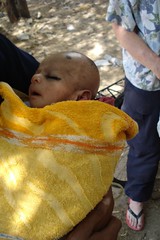 On my drive back from the project I was accosted by a beggar woman at a red light. As I travel in a three wheeler, I cannot roll up the window and look away. And anyway I never do, as I cannot forget the words of a beggar woman of yore years that were perhaps one of the greatest lesson of my life.
On my drive back from the project I was accosted by a beggar woman at a red light. As I travel in a three wheeler, I cannot roll up the window and look away. And anyway I never do, as I cannot forget the words of a beggar woman of yore years that were perhaps one of the greatest lesson of my life.
The woman held a small baby girl in her arms and almost thrust it in the vehicle. The child seemed to be asleep but one look at it made you realise that the sleep was induced and the child drugged. His head flopped backwards and is body was flaccid. As I was not carrying any eatable, I gently asked the woman to move on. The light turned green and we went our way.
For the past few weeks I have also been disturbed by a little 2 year old who lives close to our computer centre. She has recently come from the village and is the daughter of a rather elderly man know for his anti social activities in his home state and who often comes to Delhi to escape authorities. His wife is illiterate and live sin constant fear of her husband who is to say the least quite a terror. This little girl is their second child, he first being handicapped and let in the village. We did try to convince them to send the child to the project, but in vain. The little girl spends her days on the street in front of her house or in the homes of neighbours who often shoo her away.
I wonder what the future holds for these two children of India. Actually one need not wonder, one easily guess their future. The beggar child will soon be tugging along her ‘mother of the day‘ (as the woman may have simply hired it), and as soon as she is a little older will be the one knocking at car windows. As she grows older she may be even given a pair of crutches. One day she will be married off and may be the one holding her baby and begging.
The little girl from the slum does not have a brighter future. She will follow the her uncaring parents from village to city to village. She will never attend a school or get an education. She will never have friends, or toys and one day when she is barely pubertal will be married off to some older man just as her mother was and will produce other children who will have the same fate as her.
The tragic part is that there is nothing much one can do as these children belong to strong mafia like social groups that are totally impervious to change. And yet they become a challenge that one needs to address. The question is how!
“The sun illuminates only the eye of the man
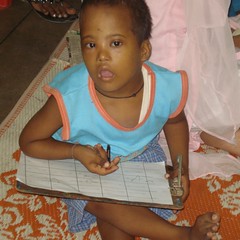 “The sun illuminates only the eye of the man, but shines into the eye and the heart of the child” wrote Ralph Waldo Emerson. How true he was.
“The sun illuminates only the eye of the man, but shines into the eye and the heart of the child” wrote Ralph Waldo Emerson. How true he was.
A few days back a little ray of sunshine entered our world. Pooja is 7 year old and has Down syndrome. Since she joined our special section nothing is quite the same. Pooja is an endearing soul and like all kids with trisomy is extremely affectionate and warm. She took no time in making a place for herself in the hearts of each and everyone. She is filled with mischief and a bundle of activity but someone no one seems to mind. Even the most taciturn of the lot cannot help but smile at her antics.
A few days back she commandeered poor Geetu’s lunch box hours before lunch time and decided to eat it. The normally prim and proper Geetu who is a tad possessive about her lunch simply smiled and even fed her. Pooja has still not accepted to follow the time table and the staff too indulges her so she makes her won day and decides who to sit with to what to do. Sometime she is seen practicing writing skills with the more advanced lot, or she decided to butt in puzzle making time of the other group and with a flick of her hand and a mischievous smile destroys the carefully constructed puzzle. What is amazing is that even Anurag who normally would throw a fit, simply smiles at her and sets out to rebuilding his puzzle.
We know that Pooja will soon settle. But what is amazing is the way in which her classmates have accepted her and made her one of them. The motley crew that makes up our special section is normally quite a handful each with their complex behaviour and mood swings. But somehow with this little bundle of joy, they seem to have set all aside. Is it because they intuitively know she needs their support and love. My little special kids never cease to amaze me. Evey day in their own unique way they teach me invaluable lessons to cherish.
the faceless Indian
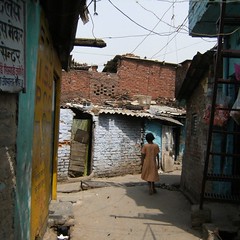 The parliamentary debate on the confidence motion trust was a gloomy moment for all self respecting Indians. I will not delve into the matter as enough has and is being said. I followed bits and pieces of the day long saga with dismay, horror and immense sadness. Less said is better. I simply chose to mention a brave speech, that of Rahul Gandhi and who was heck;ed all the way.
The parliamentary debate on the confidence motion trust was a gloomy moment for all self respecting Indians. I will not delve into the matter as enough has and is being said. I followed bits and pieces of the day long saga with dismay, horror and immense sadness. Less said is better. I simply chose to mention a brave speech, that of Rahul Gandhi and who was heck;ed all the way.
Again I am not one who condones nepotism and dynasties nor am I a sycophant. What got my attention in this speech was the fact that perhaps it was the only one that referred to the other India in a humane and real way. When RG spoke of Kalawati, he gave a voice to the hundred of millions of faceless and voiceless Indians.
There are Kalawatis everywhere. People who live a hand-to-mouth existence in a land that is becoming more and more indifferent to their needs.They pass by us so quietly that we never see let alone acknowledge them. Yet many are the warp of our very existence. And even if they do not impact us directly they are the lifeline of those who make our lives more comfortable. I am talking about the man who sells hot food to the construction worker, the man who sells handkerchiefs, socks, and cheap ware on road sides, the one who sells plastic toys a father will take back to his child at the end of a long day.
Imagine the plight of such people as they set off every morning, weather notwithstanding, with their bundle, or cart not knowing whether they will be able to bring back sufficient money to feed the family for the next 24 hours. No one buys kerchiefs or head scarves every day! And every day the same amount of rupees buy much less food. Every week we make the appropriate sounds of dismay as we are hear the new inflation figures on our slick TVs in the comfort of our air conditioned room. Yet the size of our weekly basket barely suffers. For the Kalawatis across India the story is different and it is time that we took notice. I guess that is what RG wanted to do. But did we? Or should I say did those that matter notice. We all know the answer. they were too busy playing to the world gallery and bringing shame to each one of us.
I do not know whether the nuclear deal is good or not. I do not know whether RG’s speech was a clever political gimmick or one from the heart. I only know that it brought to the fore the reality of millions of our own country mates. I wonder how many of us can even begin to imagine what such a life means. I must admit that I too was one of those living in absolute denial. Pwhy changed all that.
I see the how inflation and price rise affects the common Indian in the lunch boxes of children everyday. I see it in the eyes of a child burning with fever who was not taken to the doctor for want of money. I see it in the backs that seem more bent and the gaits that have lost their spring. Can you imagine what goes on in the mind of a woman as she waits outside her home late in the evening, her kitchen fire cold, her vessels empty and her children hungry, waiting for her husband to come back with the the handful of rupees that will buy a meal and praying furiously that he does not stop by the watering hole. There are many such women and they live but a few stones throw away from us.
Have we all lost our conscience, or have we simply lost our ability to feel. Are we so lost in hubris that we are unable to see what is happening around us. I do not know. I just feel here is something terribly wrong. In all the hullabaloo of the parliament tamasha I just heard the silent deafeaning voice of Kalawati
the length of two lifetimes
 I normally do not watch TV in the early evening. I was busy with the usual evening chores and had to go to my daughter’s room. The TV was on. A local metro channel diffusing its evening news. I was about to mouth the question I had come to ask but was stopped short as I heard the voice of the newscaster recounting an incident where a young girl had been humiliated in a nearby suburban school. All chores forgotten I just watched.
I normally do not watch TV in the early evening. I was busy with the usual evening chores and had to go to my daughter’s room. The TV was on. A local metro channel diffusing its evening news. I was about to mouth the question I had come to ask but was stopped short as I heard the voice of the newscaster recounting an incident where a young girl had been humiliated in a nearby suburban school. All chores forgotten I just watched.
A young girl had been punished by her teacher for not being up to the market in class. The teacher who seemed to belong to some ante deluvial time had chosen to write in black soot across the face of the child the following words: I am not good in my studies, and then paraded the child across the school. The teacher of course had threatened the girl of dire circumstances were she to tell her parents about the incident. The young girl had not murmured a word. However the next day she had refused to go to school. Seeing the angst on her face the parents coaxed the child to reveal what was wrong. She ultimately did.
The parents went to the school authorities and the police playing the scene according to script. The teacher was suspended and further action may follow but will and can it wipe of the hurt the child suffered, the invisible scars seared on the girl’s soul that no one can see let alone heal. No matter what punishment will be meted out to the erring school teacher, no matter the profuse apologies tended, no matter the words proffered to sooth the hurt child, the harm is done. This young girl will bear the hurt of this humiliation for a life time. It may be forgotten in good times, if good times there are but will come back to haunt her each time life poses a problem. Public humiliation is by far one of the worst form of retribution, one that cannot be meted out to a child by anyone, let alone a teacher.
This incident makes one go back to Dickensian days of Dunce tables and Dunce caps. Lot of water has flowed since those days or so we thought. But an occurrence like this one makes us wonder whether times have truly changed.
But if that was not enough another horror that befell a tiny 9 year old came to light. A little class IV girl had been raped in the toilet of her school in broad daylight. As I write these words the follow up drama is in full swing. Enquiries, suspension, political condemnations, financial assistance and the much sought headlines. But my heart goes out to the little girl who has been scarred for life. Such incidents leave deep lifelong invisible scars not only on the body but on the soul of the victim. And if that was not enough, one must not forget that we live in an insensitive and biased society where far too often the victim is made to feel guilty.
I can only once again recount the plight of C, now 17, a past student of ours who was raped at the age of 4 by a neighbour. The rape was so violent that the child had to have a hysterectomy. The rapist did his time in jail. C grew up but . As a teenager she found herself ostracised by her peers and their families and labeled as the girl who had been raped.
Child rape is something abhorrent. I have no words to condemn it as everyone falls terribly short of what I want to express. I cannot begin to understand why an adult feels the need to violate a child. I look helpless at the impotent laws that far from protecting the victim seem to benefit the perpetrators with impunity.
In all the hullabaloo that normally follows incidents like the ones above, two little girls are suffering in silence. And no one seems to be concerned. They belong to homes where child psychology and post trauma stress are unknown. They belong to families who are simply busy surviving. They will have to find their healing alone, if healing there is.
At this times one can but remember the words of Herbert Ward: “Child abuse casts a shadow the length of a lifetime.”
A room without books…
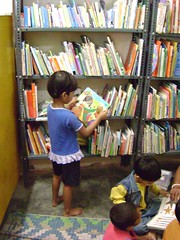 A room without books is like a body without a soul said Cicero over two thousand years ago. Belonging to a generation where books were possibly our only real entertainment I readily second that. Then over the years, books played second fiddle to the new entertainment star the TV and then slowly third fiddle till they were relegated to the back row of the orchestra as an instrument barely played let alone heard.
A room without books is like a body without a soul said Cicero over two thousand years ago. Belonging to a generation where books were possibly our only real entertainment I readily second that. Then over the years, books played second fiddle to the new entertainment star the TV and then slowly third fiddle till they were relegated to the back row of the orchestra as an instrument barely played let alone heard.
I must admit that I never stopped reading though I must also confess that I was not able to instill this passion in others in my family. I lost the battle to the ever growing presence of the idiot box and its various courtesans – namely the remote control, the VCR, VCD and all else. Book reading for many just seemed a chore and a bore.
When project why began and before I was initiated to the reality of the school scenario in India, I had wanted pwhy to be a place where children could come after school and spend quality time. One of the things I wanted in pwhy was a library with an abundance of books so that children could be made aware of the magic of the written words. Like Skinner I too believed that we shouldn’t teach great books; we should teach a love of reading, as therein lay true education. But soon enough the dream of pwhy being a children centre replete with books, toys and games took a back seat as we were faced with alarming drop out rates, failing in school and the uncompromising abhorrence of parents to creative pursuits.
Reality moulded us into a school support centre where creativity had scant place. Books were only those taught in school and the few that found their way sat quietly in some dark corner, too few to make their presence felt. Even when we felt the need to have books – for the smaller kids at least – the cost itself ensured that there was never a book per child. The dream I once had seemed farther then ever.
Then one day a few months back I received an email from Willy of the Omprakash Foundation. It was I must confess mind boggling as it talked of sending tens of thousands of books to several projects in India and sought my help. And though the task was daunting and way off our beat, the fact that it concerned books made me accept readily. I guess that if it had been clothes or something else, I would have beaten a hasty retreat!
What followed was a journey into uncharted territory, one that was sometimes quite harrowing as we battled administrative and other blocks. But one did not give up and last week the consignment reached Delhi. Thanks heaven our friends from Omprakash Foundation were there too and afer some minor and sometimes amusing hurdles we at project why got not one, or ten or even hundred but twenty thousand books!
Though many still lie in boxes waiting for space, each of our centres now has books, either on a shelf when space permits or in a trunk and the children are for the first time in their lives discovering the magic of holding a book. It has been pure magic as they dive onto the trunks and retrieve books then go about flipping pages. The excitement is palpable whatever the age as they share what they see or even fight for a particular one. The teachers too are excited and planning new activities around they newly acquired treasure.
I watched all this with a sense of satisfaction and some glee. Somehow a long forgotten and almost lost dream seemed once again possible. The presence of so many books had suddenly made my dream of a children centre possible. It was time to fine tune the idea.
Ther soon will be a weekly library period in the time table. I remembered Willy telling me that in his school there was a moment called DEAR (Drop Everything And Read). Perhaps we too will have that at pwhy some day.
Some time back a friend sent me link about a new library fad whereby you borrowed a person not a book. Somehow it did not seem exciting to me. I also remember how moved I had been by Fahrenheit 451 the brilliant Truffaut film about a world without books. For me books remain a very important part of my life and high up on the list of my favourite things.
I hope that now they can also become part of the lives of the project why children.
no english for girls
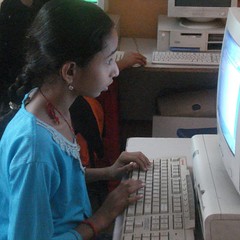 A news item on a leading TV channel caught my eye yesterday. In spite of girls performing better in schools at every level, the number of girls joining the English medium stream in local government schools is still small. The reluctance according to a secondary school principal comes from the parents. In spite of the fact that their daughters have good marks, parents are often disinclined to see them join this stream. On the other hand they are insistent upon their son doing so, even if his performance is poor.
A news item on a leading TV channel caught my eye yesterday. In spite of girls performing better in schools at every level, the number of girls joining the English medium stream in local government schools is still small. The reluctance according to a secondary school principal comes from the parents. In spite of the fact that their daughters have good marks, parents are often disinclined to see them join this stream. On the other hand they are insistent upon their son doing so, even if his performance is poor.
Another sad tale of gender bias that seems to pervade every inch of our social fabric. Though reasons for such a behaviour were not spelt out, one can easily guess them. Girls are simply meant to be married and the less they know the easier things become. Too much education may just make them too difficult to handle.
Gender bias in present in each and every moment of a girl’s life, even before she is born. The sex ratio figures are ample proof of the number of girls that are denied the right to be born. It is believed that over 24 000 girls go missing every year in India’s capital city. And even after they are born girls do not get the same deal as their male siblings. I have often written about the plight of the girl child as about possible ways out. I have often felt at a total loss when in spite of all our efforts we have been unable to help a girl child. I have often sunk into despair at the deafening whys that have no answers.
We have over the past years tried to convey to parents that there is no difference between a boy and a girl but it seems that things have not changed. As I write these words I ask myself whether really have the right to proffer words of advice knowing that the reality on the ground has not changed. Girls are still considered a millstone as they need to be married and marriage costs more than one has. I refuse to believe that girls are not loved per se. It is the social burden that the presence of a girl in the family entails that causes people to shun the. Or to look at the coin from the flip side it is the lure of what a boy can bring in that makes people want them.
The bottom line still lies in changing customs and mores. Easier said than done. Customs and mores are deeply ingrained in our atavistic past. To change them requires not laws and sanctions but perhaps intervention from religious heads and social leaders. It also requires every one to walk the talk. Till then little girls will not get the same education, the same clothes, the same food or the same care as the one given unabashedly and without restraint to their male siblings.
saving the planet – a quaint dilemna
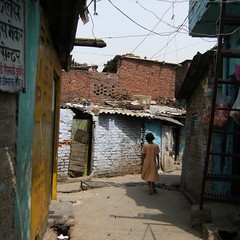 Saving the planet is a fashionable conversation piece. It has been so for quite some time. Yet how many of us walk the talk? To once again use Don Rittner words: “Trying to save ecosystems has more to do with changing egosystems.”
Saving the planet is a fashionable conversation piece. It has been so for quite some time. Yet how many of us walk the talk? To once again use Don Rittner words: “Trying to save ecosystems has more to do with changing egosystems.”
And there are many egosystems at play.
We are all aware of what awaits us. Nature is making herself heard: untimely rains, no ice in the polar region and more of the same. But are we listening? We seem to be simply busy increasing our carbon footprint by the second. New credit options now available to all have increased the number of bikes, TVs and other energy consuming ware. A short walk though any slum in Delhi is proof of the fact that the one thing that is present in each and every home is a switched on TV, even is not one is watching. perhaps it is the indelible proof of a new success story.
What once was the prerogative of a chosen few, now permeates the lives of the poorest of the poor via the plastic pouch that makes even the most expensive item available to all. At the rate of over 10 pouches per family the load on the environment is difficult to fathom. The recently installed taps ring the newly acquired freedom from long trudges with heavy buckets by spewing water even when not needed.
The new credo of achievement and success in urban slums spells disaster for the environment. At the other end of the spectrum, things are no better. The rich and educated only pay lip service to environmental issues as they continue increasing their carbon foot print with impunity. Everyone is firm in their belief that they have earned the right to do so. A hubristic mood seems to have pervaded one and all. Nemesis looms large but no one seems to care.
In the strange interplay of egosystems lies the challenge of trying to raise awareness on environmental issues. Easier said than done. How does one go about asking people to give up what they have recently acquired after years and generations of want and deprivation. How does one tell the proud and slightly arrogant owner of a gleaming bike to walk rather than ride? How does one tell a family to switch off the TV that they dreamt of for years and whose droning helps alleviate many a harsh moment? The list endless and the arguments few.
And yet we all know that the writing is on wall.
At pwhy we have over the years tried to address these issues without much success. Most of our environmental programmes have not yielded the results we hoped. Though they may have given some short lived effect, we never managed to bring about sustained change. Yet we are aware of the fact that issues like water, plastic, and limiting carbon emissions are as important as the proverbial 3Rs but where does one begin, or should I say start again. Egosystems are hard to change. Perhaps we should just set about walking the talk.
…equals all the people in the USA
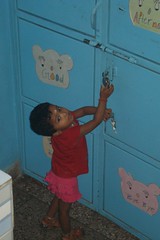 India’s illiterate population equals all the people in USA screamed the headline of a State of the Indian Education report in a leading newspaper. It did not end there. The other headliners were: 9 out of 10 in class I won’t get to college, Most students pass, few actually learn and the supporting statistics were nothing short of chilling.
India’s illiterate population equals all the people in USA screamed the headline of a State of the Indian Education report in a leading newspaper. It did not end there. The other headliners were: 9 out of 10 in class I won’t get to college, Most students pass, few actually learn and the supporting statistics were nothing short of chilling.
India does a good job of getting children to start school but fails miserably to keep them studying as they grow older. That is the sad but indubitable reality. And if the pass percentages are increasing thanks to dubious programmes, the learning curve is declining day-by-day.
The report was alarming. Education for all seems to have failed miserably. True that the numbers ring true: number of children going to school, number of schools, number of teachers and even number of children passing, but the ground reality is abysmal. In our rush to meet quantity, quality was forgotten along the way. True we have schools buildings but a large number of them are not fit for consumption!
Politicians are busy securing their future and brandishing issues like reservations in higher education for the most backward classes and castes, but one wonders who will benefit from these lofty programmes. I guess their own kith and kin armed with a sound education obtained from a good public school.
Education for the poor in India is dying a slow insidious death. The onus of a good education for all has to be on the government who alone can provide the needed resources and regulatory systems but the government seems to have failed, and in some cases even given up as is amply proved by the rush to hand over education to NGOs or private hands. Privatisation of education will ring the death knell of education for the poor.
A couple of years back I was contacted by a high ranking officer in the Municipal Corporation of Delhi. A proposal for handing over municipal schools was being mooted. The officer wanted to know if i would be willing to take over the school located near our centre. This school is mostly attended by extremely poor and deprived kids. Wanting to now more I decided to play the game before hitting out and asked him what the deal was. We will pay the teachers salaries and you need to take over the rest was the answer. I wondered where the rest was supposed to come from: from donations or from fees. Needless to say the poor man got a mouthful from me! I had almost forgotten this incident.
Education in India today is a very sick child. And I am not only referring to state run schools. The other end of the spectrum is as dangerous. Instead of regular places of learning have sprung designer schools that bear no resemblance to what a school should look like hence alienating children from the reality that surrounds them and that they will one day have to live in. A ride from an air conditioned home in an air conditioned bus to an air conditioned school is what school is for some. Has one forgotten the gurukool of yore times where even the king’s sons had to undergo rigorous and austere training?
Where is the solution? I wonder….
a lesser evil
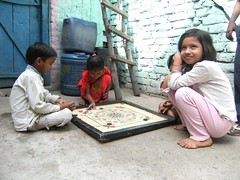 A few more musings in continuation to my last post about the new no-fail policy announced yesterday by the Delhi Government. At the outset I would like to say that in an ideal situation I, more than anyone else would have welcomed this move more than anyone else, and may I add that even a few years back, when I was still blissfully unaware of the ground reality about the education scenario in Delhi, I would done so too. Sadly today that is not the case.
A few more musings in continuation to my last post about the new no-fail policy announced yesterday by the Delhi Government. At the outset I would like to say that in an ideal situation I, more than anyone else would have welcomed this move more than anyone else, and may I add that even a few years back, when I was still blissfully unaware of the ground reality about the education scenario in Delhi, I would done so too. Sadly today that is not the case.
My thoughts were seconded by most of my teaching staff who were stunned at this new reality that would alter many things for us at pwhy! A very well packaged news item was aired yesterday on a leading metro channel to herald and applaud this new move. It even had a dazzling title and tag line: arresting girls drop out rates!
Based on my experience of almost a decade let me play Devil’s Advocate. The policy of not retaining any child in primary classes has already shown its true colours. Children, and there is an abundance of them, sit in class IV or V barely knowing their alphabet or numbers. Till date class VI loomed large as a place where they would have to perform and motivated parents as well as children to try better. I say parents because for them it was examinations and their marks that altered behaviour. Let me explain.
Examinations and the ensuing risk of failure was a deterrent that would make the child work harder and the parent more lenient. Many little girls are spared house chores during exam time and many unruly boys are bullied to sit and study. Parents in spite of their somewhat modest means find ways to send their children for tuition because of the exams and failure risk. This is a boon in disguise as we all know how much teaching there actually is in state run schools. Marks are something the poor and illiterate relate to, grading and alphabets belongs to an alien world.
A quick perusal of the proposed scheme shows that though it is lofty in its ideal, it is bound to fail on the ground. The actual education system barely manages to muddle through a conventional system; wonder what will happen now as the teachers and their ways cannot see a dramatic transformation simply because a new law has been brought into existence. What will happen is that the back up system that existed – parents attitude, extra coaching etc – will merely disappear as no exam and possibility of failure exists.
Even the kids will not feel the need to study and learn as they will know that no one can fail them till class VIII. Hence they will reach class VIII or IX with an enormous amount to catch up with as ultimately they will have to sit for an end of school examinations where marks hold the keys to the future.
Not a happy situation.
Pwhy’s secondary teachers were almost up in arms when they heard the news as they more than anyone else have the daunting task of making up for years of poor performance. And as one quiet voice said: maybe parents will stop sending their kids to pwhy as one of the main reasons they had was to ensure that their children do well in examinations.
the mad hatter’s book launch
 Day two of the book launch and what a day it turned out to be. Two events were planned in two locations as different from each other as chalk and cheese: a very upmarket hospital and a middle suburban mall; the common denominator: the presence of a chain book outlet. I must admit that the choice of the hospital was rather bemusing as the launch was to include a theatrical performance. But ours is not to…
Day two of the book launch and what a day it turned out to be. Two events were planned in two locations as different from each other as chalk and cheese: a very upmarket hospital and a middle suburban mall; the common denominator: the presence of a chain book outlet. I must admit that the choice of the hospital was rather bemusing as the launch was to include a theatrical performance. But ours is not to…
As we were getting ready, a telephone call informed us that our dear publisher had taken ill at night and was feeling hellish. Ominous…
We reached the hospital and weaved our way to the tiny bookstore located in one of the numerous waiting halls filled with anxiety ridden families where the hum was often broken by incomprehensible announcements over a PA system. The appointed hour of the event struck and went by. Confusion prevailed and tempers threatened to rise. Chairs were moved around and bewildered people were made to readjust themselves. Soon a trio took seat next to the bay window and started beating a drum. I do not know why but what came to my mind was a page from Alice in Wonderland. Were we to be guests at the Mad Hatter’s tea party?
Drums beating in a space replete with Silence Please signs looked incongruous. We barely had time to take the situation in when a posse of angry looking men arrived and put a stop to the whole show. A senior doctor had objected, quite rightly, to the noise and ordered it be stopped. By that time some guests had arrived to, each one wondering what was happening. What ensued was a expected: parleys and discussion, a bit of blame game and then the inevitable: there would be no launch, no book reading, no show.. It was time to pack up, the party was over.
Anyway there was still another launch, later in the day, miles away..
Come 4 pm and we all gathered in a middle class mall near the food court and blissfully the kids play area. This little messy mall was more to my liking than the hoity–toity one of the first launch. The stage had been set, the actors were ready and the show would begin once a mike was found. In the meantime the play area beckoned big and small and Utpal, Kiran and Shamika decided to have a blast, and boy they did!
In the meantime a mike had been found and the show began. A rendering of parts of Dear Popples and the Prayer and then some book reading. A handful of people watched the on-goings, and then it was time to go bit not before some goodies were bought to be savoured during the long return drive.
All in one the two day experience was one to remember. Nothing was as expected and yet when one looks back a lot did happen: wonderful connections were made, a family of five was saved and a bunch of kids big and small had a whopping time!
here are some pictures of day 2
| www.flickr.com
|
a launch to remember part 1
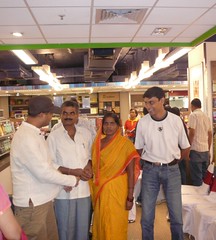 Dear Popples was launched this week end. A series of events – three actually – had been carefully planned: two in malls and one in a hospital! I must confess that the past few days had been filled with excitement and apprehension. Dear Popples is the first book I have written and hence this was to be my first launch. I had been told that there was to be a book reading and signing and a quiz where people would play for a miracle. At the end of the day Basant and Rekha’s family would be saved. Over 100 people I was told, had entered the contest! This was great news. The event promised to be a whopping success. Innumerable calls were made, and mails were sent to ensure that may would attend.
Dear Popples was launched this week end. A series of events – three actually – had been carefully planned: two in malls and one in a hospital! I must confess that the past few days had been filled with excitement and apprehension. Dear Popples is the first book I have written and hence this was to be my first launch. I had been told that there was to be a book reading and signing and a quiz where people would play for a miracle. At the end of the day Basant and Rekha’s family would be saved. Over 100 people I was told, had entered the contest! This was great news. The event promised to be a whopping success. Innumerable calls were made, and mails were sent to ensure that may would attend.
Saturday morning dawned. I must admit the night had been short. A palpable sense of excitement permeated the house as we all got ready. There were many of us, almost the same gang that takes the monthly ride to Utpal’s PTM except that this time Utpal, was with us. Rekha and Basant had come early. Abhigyan, my wonderful publisher who I had finally met the previous day arrived and it was time to leave. The event was in a brand new mall in Gurgaon a long drive away. We reached the mall. It was the very one where we had come to a year back for a PTM. Ominous!
We reached the right gate and could see the sparkling book store an escalator ride away on the first floor. But Rekha being blind and having never in her life seen or heard about moving staircases, we set off in search of a lift or staircase. We found a lift but though we reached the said foor, we found to our utter dismay that there was no access to the store. There was no staircase either. How did one get Rekha to the store. Finally with much effort we managed to convince the operator to stop the escalator. Rekha was made to climb on it and then the machine was restarted. It was an ordeal and I cannot even begin to think what must have gone in the poor woman’s mind. At last every one reached the store.
The place had been beautifully laid out with chairs, and armchairs, tables ans flowers, large display of the books to be launched, larger than life sized posters, a screen, mikes et al. What was missing was people though the said time had past. Once again I was reminded of Kafka. Barring us there was no one. One could almost sense moods changing. Anger in some, bewilderment in others. A sense of amused deja vu filled me. Oh darling hey hai dilli was what I felt like screaming. People do not come out of their comfort zones at 11 am on a Saturday morning, people fill forms for quizzes ans events and hen simply do not turn up, people promise to be there and then forget to come or forget to inform that will not. Anyway the chairs lay empty for a long time. Slowly friends who had been solicited, entreated and bullied started trickling in and some chairs got filled. Even Mrinal and Anil, whose flight from Mumbai had been terribly delayed made it on time.
But the show must go on and it did. The show had to go on and it did. Rekha and Basant’s miracle had to happen and it did. There was a book reading, a book signing and a quiz even though many chairs were empty and contestants few. What was important was that all present had the ability to see with their heart and hence as the fox told the little Prince only the essential was visible.
You can share some pictures of the event here:
| www.flickr.com
|
mellow musings
 The last post was angry though I had promised to myself not to succumb to anger. But there are moments when resolves break. I am but human. But the anger passes and often a mellow mood follows, one when you try to reconnect with the simpler things and heal yourself.
The last post was angry though I had promised to myself not to succumb to anger. But there are moments when resolves break. I am but human. But the anger passes and often a mellow mood follows, one when you try to reconnect with the simpler things and heal yourself.
Last week was so hectic – a book launch, an important visit and a bout of fever – that I almost forgot a very precious incident. Utpal spent some days at home. One evening he went to the market with Radhey his long time pal and came back with a small glass bowl filled with what looked like glass beads but turned out to be made of some gooey unidentifiable and quite yucky matter. He was all excited as he entered my tiny office clutching his precious ware. He stomped to my table and placed the bowl carefully: he then turned to me and said: this is a present for you, it shines at night so you will not be scared when it is dark!
Needless to say, I was terribly moved – throat tight and tears welling up – as I hugged the little fellow. Needless to say that the cheap glass bowl suddenly became very precious. For those of you who do not live in Delhi and hence do not spend time at red lights getting pestered to buy strange ware, this is the latest offering from China. A small packet filled with what looks like glitter till it is placed in water where t swells to 600 time its size and becomes gooey beads. A glass bowl comes with it, or you may just buy a bowl filled with already bloated beads. Wonder how many people do buy them, and why.
My bowl is unique, just like the Little Prince’s rose. For Utpal it was something that could adorn my sancto sanctorum, a place replete with memorabilia of all kind, each having a story to tell. It is not simply a glass bowl filed with cheap gooey beads. It is what little Utpal found good enough to have a place in my office. It is laced with the love and tenderness of a little boy. I know it will sit on my table for a long time and I also know that my eyes will often stray towards it as my heart fills with wonder and pride. And perhaps, it may just soothe any threatening bout of anger in days to come.
equal opportunities
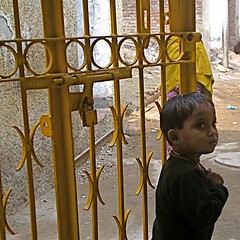 A comment on my latest post reads: A comprehensive solution that caters for reduced population growth, offers equal opportunities to all Indians, offers a fair and just judicial system, and a fair market where people can achieve their goals with no fear is what we need. Wow! Wish one knew how to conjure that, but sadly one does not have the magic wand required. The commentator feels that we cannot limit ourselves to education and perhaps he is right, but to me it seems to be the only logical starting point that may one day open many doors.
A comment on my latest post reads: A comprehensive solution that caters for reduced population growth, offers equal opportunities to all Indians, offers a fair and just judicial system, and a fair market where people can achieve their goals with no fear is what we need. Wow! Wish one knew how to conjure that, but sadly one does not have the magic wand required. The commentator feels that we cannot limit ourselves to education and perhaps he is right, but to me it seems to be the only logical starting point that may one day open many doors.
One does not have to be a rocket scientist to realise that in today’s day and age, the well educated have a head start in life and maybe the Education for All programme should be renamed as Good Education for All or Fair education for All!
While I was writing this post another comment dropped by. It said pardon me, but i fail to see the social evil of a prestigious educational institution raising its bar. the tougher the goal, the harder one works, the better the ones who qualify and the better the end result. Education is a right, but excellence is a prize one must earn. It is sad indeed that your students will now not be able to enter DU, but surely there are other places they can, and if they are not motivated/empowered to begin with, what magic is an admission in a university going to make? I am saying your students are to be blamed for bad performance, i have worked among high school dropouts and i know at least some of the difficulties and so i suggest you turn this in to an incentive for the rare motivated child, than turn it into an opportunity to complain.
I mean no ill will, this is not a rebuke, please do not take offense, i merely want you to think again.
I must admit that at first it raised my heckles. But with all due respect to the commentator who chose to remain anonymous I did think again as suggested and rather than go into a useless diatribe I chose to answer each point made.
There is certainly no social evil in any education raising its bar provided every bar down the line is also raised. I mean let us raise the pass percentage of school leaving examinations. When I was a student the highest marks veered around 65% with a low of 33. Today we see 99% at one end still 33 at the other. The tougher the goal the higher one strives is again an acceptable maxim but how does one reach that goal if one of the contestant has to run the race with his feet tied up. Let me explain in some government schools – and I have this from the horses’s mouth – the entire curriculum is not even taught as iIwas told by a school Principal: only 40% is needed to pass. And I am not even mentioning minor adavantages like educated parents, access to good books, computers etc.
No Sir, most my students will not access prestigious institutions but not because they do not have the ability to do so, but because they have run a lame race from the beginning. And true there is no magic in an admission to a university, but every child has a right to this access.
Of all that has been written in this comment, the one thing I cannot and will not accept is that my students are to blame for bad performance. How do you blame a kid who has never been taught properly in school. one that goes back to a violent and abusive home, one whose childhood has been hijacked by all. Every child has potential. It is our duty as a society to provide an enabling environment from him or her to grow to its full potential.
If schools did provide that enabling environment then there would be no reason to complain. Schools today simply reflect our society. They are schools for the rich that become richer and school for the poor that seem to become worse by the day. If one has air conditioned facilities the other does not even have toilets or drinking water. School has to be a level playing field, a learning experience, a place to discover that other realities exist, a space to rub shoulders with all and share knowledge. Only then will every child have the possibility to access higher portals and contribute to the change we all seek. And only then will I accept the accusation levelled against my kids.
Yes anonymous friend I have thought again, and it has made my resolve stronger. It is time we offered equal opportunities to all Indians.
musings
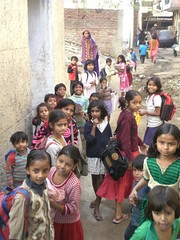 The Delhi University cut off lists are out. A whole 1% higher than last year! You need 90% and more to secure a seat in a prestigious college, and at least 75% to find space in DU (Delhi University). Anything less than that leaves you with few choices: a correspondence course or if you family is endowed, a seat in the new kids on the block: the mushrooming private colleges and institutions that come at a hefty price.
The Delhi University cut off lists are out. A whole 1% higher than last year! You need 90% and more to secure a seat in a prestigious college, and at least 75% to find space in DU (Delhi University). Anything less than that leaves you with few choices: a correspondence course or if you family is endowed, a seat in the new kids on the block: the mushrooming private colleges and institutions that come at a hefty price.
Statistics show that over 100 000 kids passed their class XII Boards. However one wonders where most of them will go as the pass percentage marks remain frozen in time. 35% still gets you your exam and 60% still gives you the 1st division tag.
Something is not right. Or are we mute spectators to a system that pays lip service to education for all while ensuring that the spoils remain the prerogative of a few.
For almost a decade now we have been striving to ensure that children from underprivileged homes do not drop out of school and obtain the much coveted class XII Board. It has been a handicap ridden obstacle race. Practically no teaching in schools, illiterate homes, poor motivation of parents and more. And yet year after year we have ensured that all pwhy get the coveted pot of gold. I must admit that though we have had a handful of 1st divisions (above 60%) and a sprinkling of kids with 70% and above, the majority of pwhy children secure marks between 45 and 52%. This means that the doors of DU are closed to them. And as they all come form poor backgrounds, they cannot accede to private institutions. Somehow for them the journey ends there.
Boys may join some vocational course or the other and maybe a get a job; girls are condemned to stay home waiting to be married off and produce more children who will be destined to teh same fate.
The sad reality is that one cannot see the end of the tunnel. One may wonder where the solution lies or is it that we just accept that we are fighting a losing battle. We all seem to agree that education is the magic potion that would change India. But is it the kind of education that we see around us today?
a unique hour
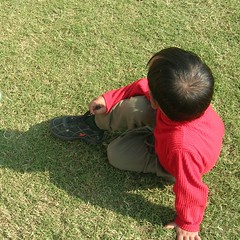 How many of us do actually switch off lights when we leave a room, never leave our computers or TVs on stand by, segregate our house waste shut the tap off while we brush our teeth, carry a cloth bag during all our shopping sprees, or travel in a car pool. Not many I guess. But are we not also the many who lecture others on all of the above, nod our heads vigorously during any debate on saving the environment and are the first to sign any petition on the same.
How many of us do actually switch off lights when we leave a room, never leave our computers or TVs on stand by, segregate our house waste shut the tap off while we brush our teeth, carry a cloth bag during all our shopping sprees, or travel in a car pool. Not many I guess. But are we not also the many who lecture others on all of the above, nod our heads vigorously during any debate on saving the environment and are the first to sign any petition on the same.
Yesterday someone mentioned a recent article predicting that the North Pole would actually melt this summer. His words brought terrible images to mind, yet before this could truly sink in, the conversation that was threatening to become disturbing moved on, as is too often the case, to a lighter vein. Somehow we always tend to push away what has the potential to rock our boat.
Yet the writing is on the wall: global warming is no more a topic to be debated it lies at our doorstep as we have seen this summer in Delhi. True that there was practically no summer this year, no hot searing heat that sweetens the melons and kills the mosquitoes. True again that the rains came early and the temperature remained low. But this is no cause to rejoice as it is a portent of things to come. Nature has been disturbed and no one knows what lies ahead.
Awareness on environmental issues has been something that we at project why have tried to disseminate, and I say tried, as I must confess our attempts have not been successful or maybe not wholehearted enough. Most of our efforts failed as they clashed with mindsets – our children will never clean streets was the answer to our no plastic programme – or social attitudes.
And yet we know that something needs to be done. It is with this in mind that I approached a friend who walks the talk as far as environment issues go. What I sought was a scintillating project that would look good on the pwhy CV! What my friend suggested was quite the contrary. Have every one follow a zero carbon hour, was his quiet suggestion. I was a tad confused as it made no sense to me. He set out to explain his idea. What he meant was that each one of us, collectively or individually, should once a day or once a week spend one hour where we ensure that our carbon footprint is nil. Translated in other terms it means that for that one hour we use no cellphone, no computers, no iPod, no TV, no cars, no electricity, no fuel of any kind. And further translated in practical terms it means that for one hour you just take a walk or sit in a park or in a room weather permitting.
At first it seemed nothing short of preposterous and yet as I pondered over it, it was a overwhelming. A simple idea and yet one that had immense power as not only was it kind to the environment but also good for us individually. A forced meditation pause that would ensure we get off the spinning wheel and reconnect with ourselves. And there was no excuse as it cost nothing, needed no props or training and could be followed by all.
At this moment of time I do not know how this will be accepted by our team. I do foresee obstacles and hurdles but at the same time I know I am going to use all the power I have to see it happen: maybe not an hour to start with but 30 minutes; maybe not everyday to begin with but once a week but we at project why will adopt a zero carbon hour programme.
To be continued…
Why is God laughing…
 Why is God laughing is the title of Deepak Chopra’s latest book. I have not read it. Yet, just the title filled me with a deep sense of joy.
Why is God laughing is the title of Deepak Chopra’s latest book. I have not read it. Yet, just the title filled me with a deep sense of joy.
A review of the book states: it shows us without a doubt that there is always a reason to be grateful, that every possibility holds the promise of abundance, and that obstacles are simply opportunities in disguise. In the end, we really don’t need a reason to be happy.
Why is God Laughing. I guess simply because he sees the big picture and knows that ultimately all falls in place. And I guess wisdom lies in realising just that.
We, humble mortals, have perfected the art of holding on to the tiny bad moment forever, wallowing in it, and refusing not only to let it go but refusing to look beyond. And thus zillions of happy and almost perfect moments pass us by.
I must admit that there was a time when I too did just that. But pwhy changed it all. The past few years have shown me that every moment is worthy of celebration and that nothing is too daunting; one just has to have the ability to wait that little extra moment as even the darkest cloud has a silver lining.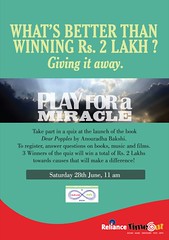
You can think that there will never be a way out of the momentary darkness, and yet there is. And what is amazing is that the way out is often most unexpected. When Basant first came to me, I could not even begin to imagine how we would help this little family as dice seemed loaded against them. And yet God was quietly laughing as he knew the way out. And what is truly wondrous is that the solution would bring together unrelated things. The launch of dear popples, a precious personal dream, would also usher a new dawn for Basant’s family
And this is but one example, the latest in a series of plenty. I never imagined how manu, utpal. babli, neha and many others would come out of their darkness, and yet they did, each one of them in the most unexpected ways.
Yes God is laughing and I am busy being grateful!
farewell class of 2008
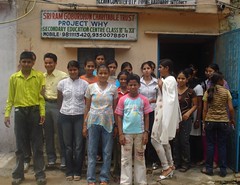 This is project why’s class of 2008. They have all passed their Boards examinations and are ready to taken their first steps in the outside world with confidence and aplomb.
This is project why’s class of 2008. They have all passed their Boards examinations and are ready to taken their first steps in the outside world with confidence and aplomb.
But yesterday was party time and this picture was taken just a few minutes before they set out for a movie and a treat. I watched them set off with a sense of pride laced with a dash of sadness. This was probably the last time I would see them all together. The morrows belonged to them.
One just hoped that the few years they spend with us would help them in their new ventures. Some are planning to go to college, others are looking for vocational training options. Some may soon be married and others may need to start working to help their families. Some may drop by and see us; others we may never see again. And yet they remain part of us.
farewell class of 2008!
The world is full of wonders..

The world is full of wonders and miracles but man takes his little hand and covers his eyes and sees nothing. The words of Israel Baal Shem came to my mind when I saw this picture after a long time. Actually I was putting together a presentation for the launch of dear popples and hence looking through old pictures.
Anyone looking at this child splashing away in a five star pool would never believe that he had once been practically written off by all! And yet today he lives, laughs, goes to a boarding school and is just another little happy boy. He is one of the many miracles that have come our way but that we tend to hide by covering our eyes with our little hand. Or is it that we at project why have simply become inured to the plethora of wonders and miracles that have come our way.
A young girl who tops her school, a handful of kids who are busy making up for lost time now that their hearts are fixed, a young mother fighting a debilitating disease, a disabled beggar who now has a warm bed, a home and a new family, a bunch of kids who would have dropped out of school but who now are assured of a sound education and a small family quietly waiting for a miracle.
I am glad that seeing this lovely snapshot brought Baal Shem’s words to my mind. Far too often in life we tend to glean over tiny problems and minor impediments and forget all the wonders around us. And lost in our limited vision we simply forget to be grateful for the abundance that surround us.
It is time we took away our little hand from our eyes and simply looked around with us with gratitude.
they wait for a miracle
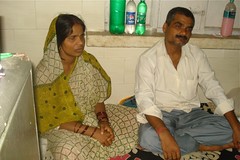 In a tiny room where barely a bed and a small cupboard fit sit Basant and Rekha. They have been living in this ‘free’ dharamshala (hospice) for almost a month now, but this has not been their first stay here. They are now old hands at living in hospitals across the land.
In a tiny room where barely a bed and a small cupboard fit sit Basant and Rekha. They have been living in this ‘free’ dharamshala (hospice) for almost a month now, but this has not been their first stay here. They are now old hands at living in hospitals across the land.
Their story beats any of the tear jerking celluloid tales so popular in the sixties, the only difference is that it is not a story but real life. The quiet acceptance and the sated dignity are not performances that will beget national awards. The love, tenderness and compassion chiseled on Basant’s face is not for the cameras, it is what he truly feels for his blind wife. He does not even remember how long it has been, or how many hospitals in how many cities he has visited to try and rekindle the light in the eyes of his wife. They have now been at AIIMS for the umpteenth month an were held the last blow a few days back: the cost of medicine that may restore some vision to Rekha’s eyes was so prohibitive that they did not even take the name of the pills that come at 45o rs a piece and of which 2 have to be consumed each day for at least 30 days.
There is no anger, no bitterness, no indignation; at best what one feels is a sense of dignified resignation. Many blows have come in the way of this couple but they have accepted each one of them and tried to move on. It was only a few weeks ago that Basant was told that he needed immediate heart surgery at the mind boggling cost of 100 000 rs. More figures that have far beyond the realm of reality for them. A date was fixed: 7 June 2008. It past as they were unable to pay the money.
For this man who once had a small business and enough money to live an honest life, living on charity must be belittling, yet he stand patiently in queue for the daily packet of milk or ration that is doled out. He knows he has no other option.In a few days they will be thrown out of the hospice as no one is allowed to stay for more than 30 days at a time. They have scant options: to go back to the village beaten, or try and find a way out.
I came to know about them a few weeks back and since have been trying to get the help they so need. But we need in a world where charity has taken strange avatars. It is easy to get help for a child, perhaps a woman but when you seek the same for a man, you are just shunned. Yet in the broken heart of this man lie the morrows of four souls: three little children deprived of the presence of their parents and their mom. It is no wonder that Basant’s heart needs mending. For too long it has carried the weight of a love no one understands in our world.
Away from their children they wait patiently for a miracle to come their way, for now only a miracle can save them. They have exhausted all other resources. Maybe it is time we start looking at ours. We cannot or will not give up. We will ask Basant and rekha to move to our women centre and keep on knocking at doors till we find the one that hides another heart as big as Basant’s.
Is the God of Lesser beings listening.
they came calling

We had two special visitors last week. Little Deepak and Shubhum. For those who may not remember or know them they were both residents of our heartFix Hotel.
Deepak is now a big boy, over two years old and a far cry from the cerulean baby we all feared for. Today he is all set to join our creche and take his firs steps into the big world. A lovely spirited child for whom we know, there is no looking back

Our next visitor was young Shubhum who has come to Delhi from his native village in Bihar for his six monthly check up. An endearing child, Shubhum is keen to study and his dream is to become a doctor. His father a humble tea vendor is doing his utmost to give him a good education in the best school available. Shubhum is already in class V. With young Shubhum came his little brother Rohit.
I often wonder what the God of Lesser beings has in mind when he makes his road maps. Rohit who looks like any normal child suffers from microcephaly. A slow learner with delayed milestones, Rohit is also an aggressive child with poor social skills. Rohit will need specialised care, something not available in his native home.
We have decided to support Shubhum’s studies and are now looking for options for little Rohit.
just like the salt
 To many pwhy is just an education support programme with some forays into community work, a clone of many such organisations that dot the land. I guess it is in some ways quite that, in spite of the many small and big moments we have lived in the past nine years. Yet there is another side of pwhy, one often concealed and veiled and yet one that is as precious.
To many pwhy is just an education support programme with some forays into community work, a clone of many such organisations that dot the land. I guess it is in some ways quite that, in spite of the many small and big moments we have lived in the past nine years. Yet there is another side of pwhy, one often concealed and veiled and yet one that is as precious.
A heartwarming mail dropped my way this morning. It came from a very special volunteer who had spent a month with us last year. It simply said: The past 2 weeks have been emotionally tolling for me, but somehow Divinity told me to drop by Pwhy blog. True enough, I felt much better after that. At times I ask myself why, till I came across this story yesterday in my friend’s essay:
A little monk liked to complain about everything he does, about life in general. One day, his teacher asked him to go buy some salt. When he returned, the teacher poured half packet of salt into a glass of water. “Drink it”, the teacher commanded. The little monk did, and whined, “Bitter!!” The teacher then brought the monk to a lake, and poured the remaining salt in. “Drink the lake water”, he said. The monk scooped a cup of the lake water, drank it and, with a big grin, exclaimed, “Refreshing!!” Morale of the story? The amount of pain we have in life is the same, just like the salt. Whether we taste it, depends on how large the container – our heart – is.
I guess this is why Project Why always makes a difference. It opens up my heart and lets me realize there is no point in fixing my eyes on the “small” persona.
I read the words many times. They brought a sense of fulfillment laced with a tinge of sadness. In the last nine years I have seen pwhy change not only the lives of the target beneficiaries, but surreptitiously transform the lives of many young people who come from the four corners of the world to spend some time with us. If each volunteer who has come by has left a little of his or her self, they have also taken with them a little of pwhy. Some keep in touch regularly, others time and again. But each in his or her way have shared the fact that the days spent as made a tangible change in their lives. The sadness I mentioned earlier is that most of the young souls have been from other lands or live there. I have not been able to stir the same feelings in those who live round the corner.
I however still believe in miracles, and hope that one day they too will learn to look with their hearts.
are times really changing
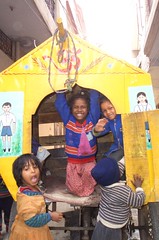 The spiralling and sky rocketing price of petrol in the past few weeks has finally, or so one hopes, brought to fore the need to pause and think about the necessity to change our ways. Till now the pleas of environmentalists fell on deaf years. At best we nodded agreement to all that was said/written/seen while we fans or ACs ran in empty rooms in our own homes.
The spiralling and sky rocketing price of petrol in the past few weeks has finally, or so one hopes, brought to fore the need to pause and think about the necessity to change our ways. Till now the pleas of environmentalists fell on deaf years. At best we nodded agreement to all that was said/written/seen while we fans or ACs ran in empty rooms in our own homes.
Words life carbon footprint and emissions made good erudite conversation points, the news of glaciers melting brought the right expression of concern, but nothing got translated into action. It was always felt that others were responsible for all the horrors that befell our planet, our contribution to its slow destruction being oh so negligible: what difference could we make.
Even we at pwhy stand guilty of this as we let our awareness and environment programmes wither away. Somehow it found no takers, or perhaps were we not committed enough. Our only true contribution I guess is our use of green fuelled vehicles , a decision taken I must confess not for environmental reasons but practical and humane ones: the three wheelers have better access in slum areas and are owned by parents. I guess one has also time and again made the politically correct noise but how far have the words been translated into action. Not far at all I must admit. True we have solar energy at our women centre but here again it was a gift from a friend.
Our forays into saving the environment have been too far and few. It is so easy to slip back into comfort zones.
The recent petrol hike has shaken everyone out of ts torpor as it now hits where it hurts most: our pockets. Even the powers that be are talking about reducing carbon footprint: cancelling foreign jaunts and looking at alternative means of transport is the latest mantra being chanted in political circles. Recently a foreign visitor wondered whether the metro when it is completed would change things; his question was simple: would people like you and me adopt it as an alternative means of transport leaving our cars behind. Sadly the answer is in the negative. While we are willing to take metros and tubes on our foreign holidays, I wonder how many of us will take the metro to work or to visit a relative on a weekend. One can here again quote Don Ritter “Trying to save ecosystems has more to do with changing egosystems.” It is all a matter of egosystems and unless we change those nothing will really change.
People are finally seeing their dreams come true: the new Bentley or gleaming bike have just come their way so how can you ask them to park them and take a walk and a metro ride. It would be anathema. Will the new petrol price make a difference? I wonder.
Every price hike is finally taken in one’s stride. Smokers still smoke, and Bentleys and Mercedes still drive around. So one wonders what will truly shake us out of our inertia ad compel us to change? I again wonder.
The recent rains are once again a proof of our blinkered view of life. We urban animals and city dwellers are celebrating the cool clime totally oblivious to the fact that this freak weather may delay the monsoons and hence affect the crops.
Are the times really changing….
the times they are changing
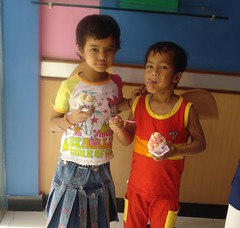 Once upon a time, not so long ago, an afternoon at the cinema was a treat almost anyone could afford. For less than a hundred rupees two persons could see an afternoon flick and even eat a greasy burger or share a fizzy drink. Cinema was for the masses. Halls were huge and catered to large numbers. The number of movies produced were in accordance with the need of such large audiences. Box office was defined by the number of viewers as well as the number of times one saw the same film. Catching a first day first show was almost a ritual. Cinema was for everyone. It was one of the platform where the two Indias met on almost level field.
Once upon a time, not so long ago, an afternoon at the cinema was a treat almost anyone could afford. For less than a hundred rupees two persons could see an afternoon flick and even eat a greasy burger or share a fizzy drink. Cinema was for the masses. Halls were huge and catered to large numbers. The number of movies produced were in accordance with the need of such large audiences. Box office was defined by the number of viewers as well as the number of times one saw the same film. Catching a first day first show was almost a ritual. Cinema was for everyone. It was one of the platform where the two Indias met on almost level field.
Was it too good to be true or did the Gods get jealous? Or was it once again the lure of what lay beyond seven seas or just market forces at play? Who knows. But came the day when the playing ground was redefined and the first multiplex appeared. A new invisible wall was surreptitiously erected. Suddenly what was once open to all, became inaccessible to some. A simple movie ticket was out of reach.
I have never been a movie goer and was quite unaware of the change. Slowly many of the cinema halls that dotted our area started closing for renovation, a renovation that rung the death knell of an era. Yesterday I decided to give a treat to Utpal, Kiran, Chanda and Radhey. The idea was to send them all to the movies, or rather should I say to the multiplex. Two adults and two children. I did not quite know how much money to give them. I handed them 1000 Rs thinking that they would also be able to buy themselves some lunch. I was horrified to learn that almost 800 rs were spent on the tickets alone and the remaining 200 barely got one cold drink and a bag of pop corn. You see in today’s new environment only branded eateries can operate in the swank halls. Gone are the days when you could grab your greasy burger or patty. And of course UtpalKiran being above 5 were treated as adults! And multiplexes have only one rate, even if you are placed in the front row. A great leveller but sadly in the wrong side of the spectrum.
Movies, at least in big cities, are no more for the poor. What was once entertainment for the masses and provided a few hours of much needed escape to many, was now the preserve of a few. You could not more plan a Sunday afternoon family outing. It would cost you a month’s wages. This is today’s reality. The times are indeed changing…
no big deal
 The picture you see may, at first glance, seem innocuous and anodyne. A bunch of smiling young ones chaperoned by an also smiling older one. True that they seem to come from different lands but in today’s shrinking world this is no big deal!
The picture you see may, at first glance, seem innocuous and anodyne. A bunch of smiling young ones chaperoned by an also smiling older one. True that they seem to come from different lands but in today’s shrinking world this is no big deal!
This is what it looks like and no offence to anyone thinking just that. However this snapshot tells an incredible tale. It begins with the meeting of four young persons belonging to different worlds. Janaki is a pwhy alumni, and one we are terribly proud of. She came to us some years back, a spirited bright girl with an insatiable desire to learn. Not only was she a keen student but also one that never shied of anything that came her way. Meeting new people from unknown worlds, participating in any activity proposed, spending more time than necessary at pwhy in the hope of acquiring that little bit more. She completed her class XII last year by obtaining a 11th position in the whole of Delhi. Today she is in college doing not one but two courses.
Willy, Gordon and Lilly are but a few year older than Janaki. They come from the land that conjures success in measures larger than life. When Willy was just about Janaki’s age, an age when kids have glitzy dreams and boundless aspirations, he came to India to volunteer in a school and took a first step in a world that would change lives forever. Deeply moved by the plight of children of a Lesser God, he with some freinds decided to do something. And boy they did. At an age when you are barely considered an adult, they set up a foundation to help organisations engaged in developmental work. And in the span of a few summers thousands of children from the four corners of the world were touched by the magic of these incredible kids.
We at pwhy were privileged to receive an email from them last summer and from that day onwards there was no turning back. They simply walked into our hearts. For almost a year we exchanged mails and were overwhelmed by the unstinted trust and support we got. It was a rare privilege.
A few days back they flew into Delhi and we finally met. But somehow we felt we had known each other for an eternity. Though we knew they were one of a kind, we were overwhelmed by their warmth and kindness. And as we discovered each other, we realised that they were exceptional human beings. It was a meeting of spirits where neither age, nor culture, nor social origin, nor any of the things that normally qualify and often divide human beings mattered. We all spoke the same language.
It is a times like these that I allow myself a few stolen moments to pat myself in the back. As I have often said, pwhy is my swan song and also my magnum opus. I know that it is my last chance to do something I can be proud of. And though I live by stringent canons, moments like the one frozen in this tame picture make my heart swell with pride, till I quickly move on to simply being grateful.
of pink elephants and green skies
 There is little one can say in praise of the education imparted by the majority of state run schools. The least said the better. At best it amounts to getting a low pass percentage in your end exams. More often than not it leads to the child dropping out of school at some point with a rudimentary knowledge of the 3 Rs.
There is little one can say in praise of the education imparted by the majority of state run schools. The least said the better. At best it amounts to getting a low pass percentage in your end exams. More often than not it leads to the child dropping out of school at some point with a rudimentary knowledge of the 3 Rs.
Every child, or let us say a huge majority are born with equal potential. This potential is waiting to be realised and that is what education is meant to do. Education is not just mastering lessons contained in text books. It is above all honing the ability of each and every mind to imbibe and interpret these very lessons and then to apply them in day-to-day activities. Interpreting anything requires many skills and above all our ability to be creative.
Creativity, imagination, innovation, vision are what make individuals winners. These abilities exist in every child’s mind. The best proof is the vast repertoire of pretend play that most children display. The ability to turn the most innocuous object into a wondrous one, the skill to engage in monologues or invent an invisible friend are all things that any child does with ease. The confidence to paint an elephant pink and a sky green is also present in every child till the day an adult exclaims in horror: an elephant is never pink, and the sky never green!
These are the first death knells of a budding creative mind. And as time goes on elephants are never pink again and the sky aways blue. Most kids unfortunately cannot retort by saying: my elephant is pink…And as time passes, every burst of creativity is often met with a I guess well meant never, till all skies turn blue even on a grey day.
many years back, when pwhy was still in its infancy, we held a drawing competition. There were children of all ages. We were stunned to see that all school going kids had produced the same painting: mountains, a rising/setting sun, a river, a house, trees. True there were variations on the theme: bolder colours, more confident strokes or an added flower or fish. But the basic scenery was the same. It was the one taught in all schools during what went by the name of an art class.
Yesterday we held another painting workshop on the theme: mother and child. The artists were in all in their teens. We fell of our chairs when we saw the results: we had many mountains/sun/river and only one child drew what could have passed for a mother and child, though the mom looked like something out of a fashion magazine or Bollywood pot boiler. Perhaps the child wanted her mom to look like that. At first everyone was rightly appalled as these drawings were needed for a show, but the initial displeasure was soon replaced by immense sadness as it was not fault of these kids: their creativity had been sacrificed the alter of what goes for education.
It was almost a reflex reaction worthy of Pavlov: drawing = mountain/sun/river. Even coaxing did not get us anywhere. Many kids simply stated their inability to draw from imagination. At best they said they could copy someone else’s drawing. A deal was struck. They would bring pictures of their moms and try again.
Our education system does stamp out creativity. I remember an incident when my own child was in class I and was to write an essay titled: My mother. Being a bright kid who had been taught to think for herself, she wrote about her mom: short hair, working woman et al. To her and my dismay she got an F. The reason being that all children had been given a set essay. Now the set essay talked of a woman with long hair, draped in a sari and cooking while the father went to work. That was not what my child’s mom looked like. I must confess that my furious barging into the Principal’s office was not well taken. And i must further confess that I was unable to get the school to accept my view. I had to deal with my kid and tell her that she had to comply with what teacher said. She was perplexed. Wonder what must have gone through her mind.
She gave it back to me a wile later in her own way. When she was learning the colour of the rainbow she diligently learnt the spelling of violet as v-o-i-l-e-t. When i tried to correct her, she said that was what teacher had written on the board.
Excuse this diversion. The point that one is trying to make is that education as it is imparted to a large number of children across India is one where imagination, creativity and other expressions of individuality are stifled. And whereas in ‘educated’ homes such skills and abilities are kept alive in some form or the other, in children of illiterate parents they simply die. One may argue that these talents are not needed to lead a successful life. I beg to differ. It is these very qualities that allow us to deal with life’s most demanding moments. It is these that help us solves crises, handle tricky situations and lead healthy lives. Lack or absence of imagination or vision deprives us of humour and the ability to laugh at situations and thus deflate them. It enables us to find appropriate solutions and deflect possible trouble. They are an integral part of any self respecting learning system. And they are kept alive in pink elephants and green skies.





































